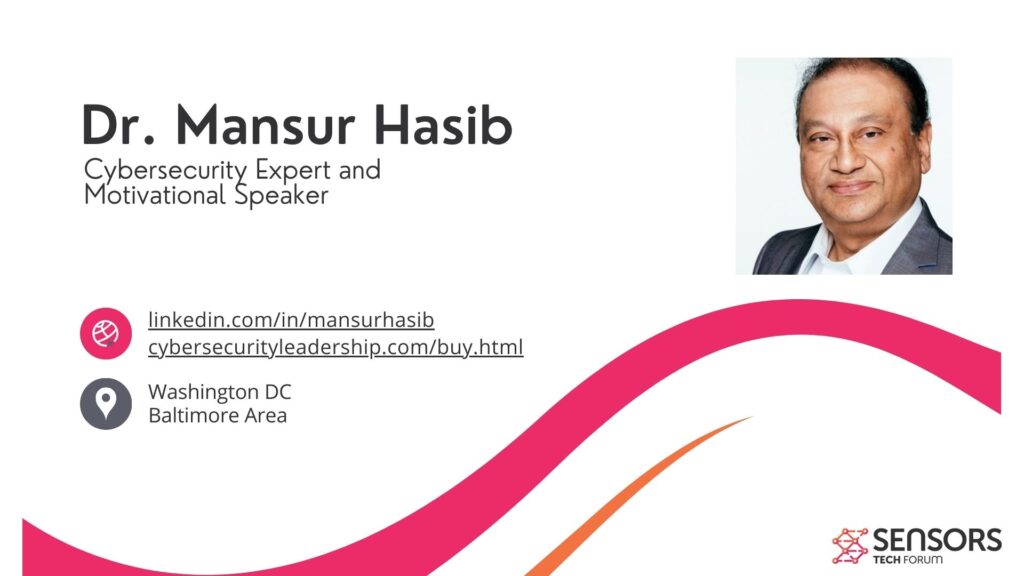In our previous conversation with Dr. Mansur Hasib, we explored his powerful vision of cybersecurity as a “people-powered perpetual innovation” – a leadership-first approach that continues to inspire professionals across the industry. Read Part 1 here: Dr. Mansur Hasib: Cybersecurity as People-Powered Perpetual Innovation.
In this follow-up Q&A session, we reconnect with Dr. Hasib to dig deeper into the evolving challenges of cybersecurity leadership, governance in the healthcare sector, and how AI and education intersect in 2025. As always, his insights bridge the human and strategic sides of cybersecurity in ways that are both practical and visionary.

SensorsTechForum’s Q&A Session with Dr. Mansur Hasib
STF: In our last conversation, you emphasized that cybersecurity is a people-powered innovation. How have you seen that philosophy evolve in a post-COVID, post-AI boom world?
Dr. Hasib: Unfortunately, the evolution has been in the opposite direction. I see conferences and vendors focusing on automating cybersecurity through AI – something quite illogical.
STF: You have mentioned that many cybersecurity problems are governance failures. In your view, has the understanding of cybersecurity governance matured among executive teams in recent years?
Dr. Hasib: Unfortunately, it has not matured in the right direction. We still see Chief Financial Officers in control and CIOs and CISO do not have the empowerment to do their jobs and, thus, there is a revolving door of these executives.
STF: How can we equip non-technical leaders, CEOs, COOs, even board members, with the right mindset to promote cybersecurity as a strategic asset, not just an IT issue?
Dr. Hasib: These executives need to attend conferences where people talk about cybersecurity leadership or hire speakers and educators to discuss this topic internally for their organizations.
STF: Since we last spoke, the healthcare sector has faced even more aggressive cyberattacks. What persistent leadership or cultural challenges are still leaving this industry vulnerable?
Dr. Hasib: During my doctoral work in the healthcare sector I had seen 50% of the healthcare sector lacking cybersecurity leadership expertise. Unfortunately this has also gone in the wrong direction. Without cybersecurity leadership and people powered perpetual innovation, the spate of breaches and losses will continue unabated.
STF: You’ve long advocated for stronger leadership development in cybersecurity. What are the key gaps you’re still seeing in current educational models, and how can we fix them?
Dr. Hasib: The major gap is in education. This is why I had created Masters and Doctoral programs to address this critical educational need. We need to implement modern graduate programs in cybersecurity that encompass the entire cybersecurity model that I shared in my book Cybersecurity Leadership.
STF: Many students and professionals still think cybersecurity = technical. How can we more effectively reframe it as a field for communicators, strategists, and change-makers too?
Dr. Hasib: Cybersecurity conferences need to have speakers on cybersecurity leadership and governance. We need to educate people from all walks of life in the field. That’s what my online graduate programs are designed to do and these are available for any university in the world that wishes to implement such education programs.
STF: You speak often about lifelong learning. What’s something new you’ve personally learned in the past year that changed or reinforced your thinking?
Dr. Hasib: Recently I have learned how to effectively add humor to any speech or presentation. This allowed me to reach the semifinals (thanks to my speech) of the World Championship of Public Speaking hosted by Toastmasters International last year.
I am competing again this year with a new speech. I have always believed learning should be fun and this new style of public speaking is making my educational sessions more fun.
Are you a cybersecurity expert that wants to be featured in SensorsTechForum’s interviews and Q&A sessions? Make sure to drop us a line at support[at]sensorstechforum.com and follow our LinkedIn page!


